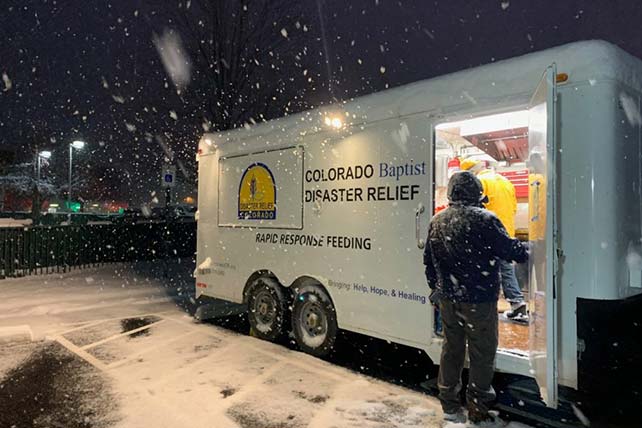LAFAYETTE, Colo. (BP) – Colorado Baptist Disaster Relief volunteers are continuing feeding efforts for those displaced by a fast-moving fire last week, a spokesman told Baptist Press.
“We’ve been feeding three meals a day for evacuees from the two fires since last Thursday,” Dennis Belz, CBDR state director, said Jan. 2. He estimated that 250 evacuees have been fed so far.
“Things are changing daily as those who did not lose their homes are finally getting to go back in since the gas lines are turned on,” he said.
A combination of a dry conditions and winds up to 115 mph whipped the Dec. 30 Marshall and Middle Fork fires into neighborhoods and unincorporated areas in Boulder County. More than 1,000 homes and businesses were damaged or destroyed across 6,219 acres, the Denver Post reported. Officials have narrowed the fire’s point of origin, but have nothing conclusive at this time.
No deaths have been reported, according to the Associated Press, though two remain missing.
Heavy snowfall Dec. 31 helped put out the fires, but the accompanying cold came as many were without heat due to damaged gas lines.
“Our temperatures have been below zero and in the teens, but the people keep moving on to minister,” Belz said. “Two of our CBDR volunteers lost their home and are without jobs now as their workplace sustained damage.”
Those CBDR volunteers, Dale and Linda Hinkle, have served in the feeding unit. They lost their Louisville home of 30 years, barely having enough time to escape with a few items out of the house. Their jobs have also been interrupted as the Safeway grocery store where Dale and their son worked has been closed temporarily due to smoke damage, and Linda has paused her work as a home health care worker.
“All I have right now is my faith in God, family and friends,” she said. “But as tragic as it is, it makes you realize what’s important. All of these possessions that we cling to … you can’t take them with you anyway. You realize how many people care about you [from the] love of our church, our friends and our family.”
A Disaster Assistance Center in Lafayette, east of the impacted area, has been established for the response and joined by a semi-truck feeding unit, Belz said. The next step is cleaning up ash and other damage as well as finding housing for volunteers, something complicated by COVID.
Sam Porter, Southern Baptist Disaster Relief national director, is slated to be in Boulder Tuesday (Jan. 4), provided flight plans aren’t impacted by winter storms and the rise of cases related to the Omicron variant of COVID-19.
Coy Webb, Send Relief Crisis Response director for the North American Mission Board, expects the weather to contribute to the response’s longevity.
“Much of the work may not be able to begin until the spring or summer, as typical Colorado winter weather will prohibit this type of work,” Webb said. “We also anticipate requests from church planting/church leaders for ministry grants to provide relief and recovery help in the affected areas.”
The most direct way others can help right now, he added, is through prayer and giving financially to Send Relief.
This article originally appeared here.

